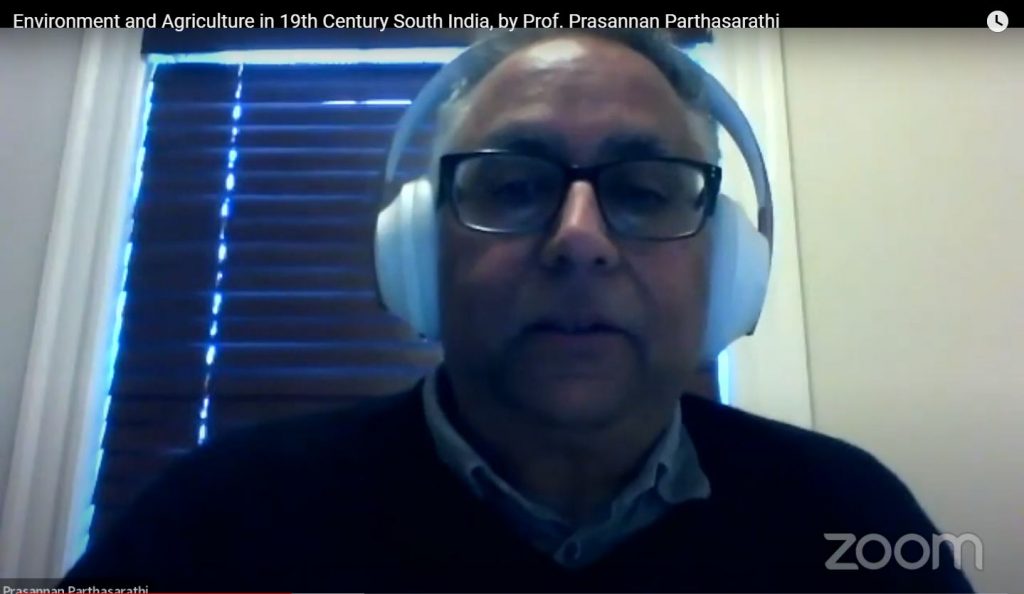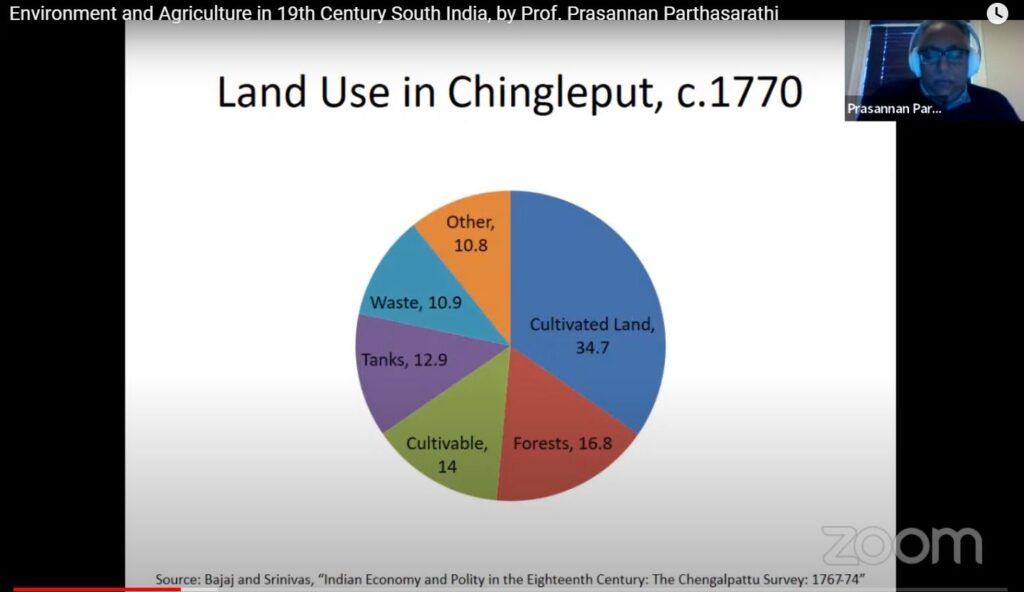Instead of treating it just as an unchanging backdrop, environment and changes to it need to be factored seriously in studying the economic history of modern south India, said Prof. Prasannan Parathasarathi, a distinguished economic historian of India teaching at the Boston College. Prof. Parthasarathi delivered the 27th talk in the UoH History Webinar Series, being organized by Department of History, University of Hyderabad, on 3 March 2022, on the topic ‘Environment and Agriculture in 19th century South India’.
The lecture explored how the ecology of Tamil Nadu was transformed significantly during the 19th century and how the links between agriculture and environment were reshaped, laying the foundation for recurring crises particularly in the countryside.
Professor Parathasarathi began his talk by citing the earlier historiographical trends on agriculture which dealt mainly with social relation of production, while his focus was centred upon ‘self-provisioning’ by the agricultural masses based on fuel (for cooking), fodder (for animals) and fish (for protein) as the essentials for their survival. He asserted that colonial ventures on forest, wastelands and water led to the scarcity of these essentials in the 19th Century, which disrupted the self-provisioning capacity of the poor.
According to him, deforestation in 19th century was done for various reasons which created problems of fuel collection from the forests. For instance, production of iron and sugar for exports required energy which was supplied through woods. Also the Indo-Saracenic architecture in 19th Century Tamil Nadu required exposed hard bricks made from bricks kilns which used large amounts of wood. Moreover, the scarcity and high prices of coal prevented its use in expanding rail networks in the region due to which the ‘Bio-steam economy’ of the region had to be run on woods. All these factors led to deforestation.
Similarly he pointed out that the wastelands in the region, which were the source of fodder for animal grazing, were reduced as they were brought under cultivation for the purpose of expanding the revenue base. In addition, the privatisation of such land by Mirasdars prevented the peasants and agricultural labourers from finding gainful employment in the agricultural sector.
During the latter part of his lecture he highlighted how the high dam building activities by the colonial government for irrigation purposes led to the transformation of the riverine ecosystem. Earlier, the fish from Bay of Bengal went upstream into the rivers to lay eggs, which was caught by fisherman to supply dietary protein to the inhabitants of the region. But the higher dams affected their migration upstream which led to the dearth of fishes and therefore hike in their prices. This again created problems in self- provisioning for the rural poor.
Connecting these issues with the economic dimension, Professor Parathasarathi asserted that the lack of accessibility of these essential items forced people to arrange them from the market at expensive prices due to their shortage of supply, straining the household budget. He cited the common occurrences of illegal wood cutting and illegal grazing of animals in the early 20th century as an evidence of the problems faced by people to arrange the essentials for their survival.
Professor Parathasarathi concluded the lecture by saying that environmental changes in the form of deforestation, reduction in wastelands and changes in riverine environment created
problems of self-provisioning which makes study of environmental history indispensable for understanding the economic history of modern South India.
Prof. Bhangya Bhukya, the Head of the Department, welcomed the online gathering and Dr. Vijaya Ramadas moderated the session. Mr. Vikramaditya Awasthy, doctoral scholar, introduced the guest speaker, while Mr. Shakti Rajwar, research scholar, proposed the vote of thanks. Dr. V.J. Varghese and Dr. Vijaya Ramadas are the coordinators of the Webinar series.
Contributed by: Vikramaditya Awasthy, Department of History, UoH
About University of Hyderabad
The University of Hyderabad is an institute of post-graduate teaching and research. The school was established by an act of the Parliament of India in 1974 as a Central University. Over the years, it has emerged as a top ranking institute of higher education and research in India. The university also offers courses under distance learning programs. The university is a member of the ‘Association of Indian Universities’ (AIU), the ‘Association of Commonwealth Universities’ (ACU) and ‘International Council for Distance Education’. An Academic Staff College has been functioning on the university campus since 1988 under the UGC scheme for improving the standards of teaching in colleges and universities. The college organizes orientation and refresher courses for college and university teachers.
For more information, visit: University Of Hyderabad



